Eggs
Salmonella is the most commonly reported bacteria responsible for foodborne illness outbreaks and is usually associated with eggs and egg products.
Salmonella infection causes gastroenteritis (‘gastro’) and symptoms can include headache, fever, stomach cramps, diarrhoea, nausea and vomiting which can last days or weeks.
Examples of food that contain raw and lightly cooked eggs and egg products include: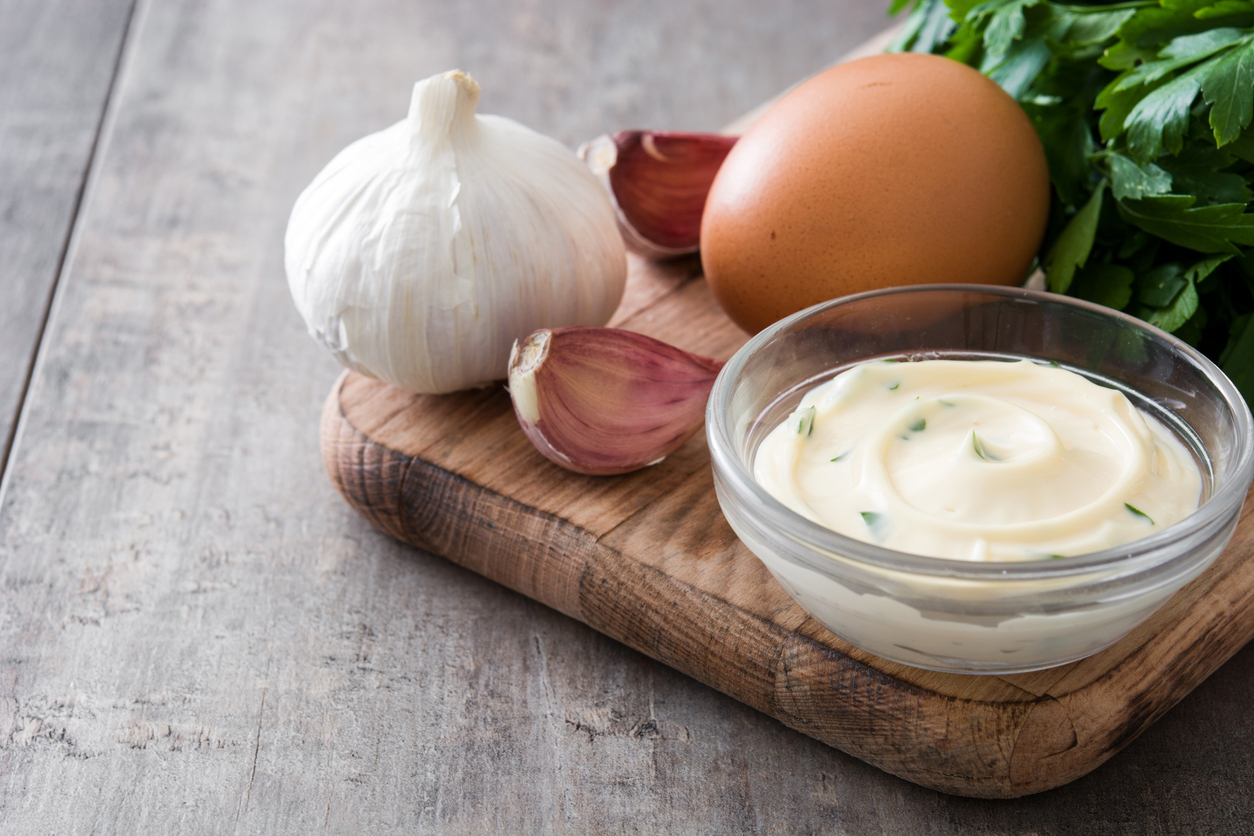
- mayonnaise
- aioli
- scrambled eggs
- custard
- cheesecake
- eggnog
- deep fried ice-cream
- mousse
- dipping batter
- hollandaise sauce
Cross contamination can also occur when handling eggs, so equipment and benches should be cleaned and sanitised to avoid contamination of ready-to-eat foods.
Not keeping eggs and raw egg products under temperature control allows Salmonella to grow and may result in food poisoning.
Do
- use only eggs that are clean and without cracks
- keep raw egg products (e.g. mayonnaise, aioli, custard) under proper temperature control (less than 5°C or above 60°C) after preparation and during service. It is best to make smaller batches more frequently.
- for egg wash that is used to prepare deep fried ice-cream, the egg wash must be either freshly made, or stored under refrigeration before use. The preparation of deep fried ice cream involves a flash frying process that is only intended to crisp the outer layer and is inadequate to kill Salmonella that may be present on the egg coating.
- it is important that the raw egg wash and coating ingredients (e.g. crumbs, coconut, flour) used to make ice cream balls is never used to coat other foods or left at room temperature after preparation. This should be freshly prepared as required.
- throw away cracked or dirty eggs.
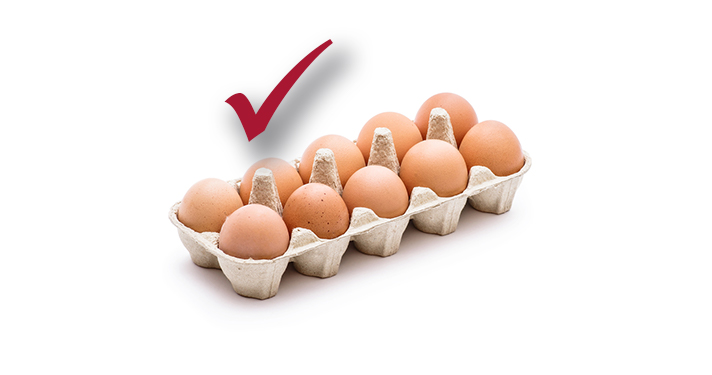
Do not
- use cracked or dirty eggs in the preparation of food
- wash eggs as this allows Salmonella to move from the outside of the shell to inside the egg.
- leave raw egg wash and coating ingredients (e.g. crumbs, coconut, flour) at room temperature after preparation, it should be freshly prepared as required
- use raw egg wash and coating ingredients that has been used to make ice cream balls with other foods.
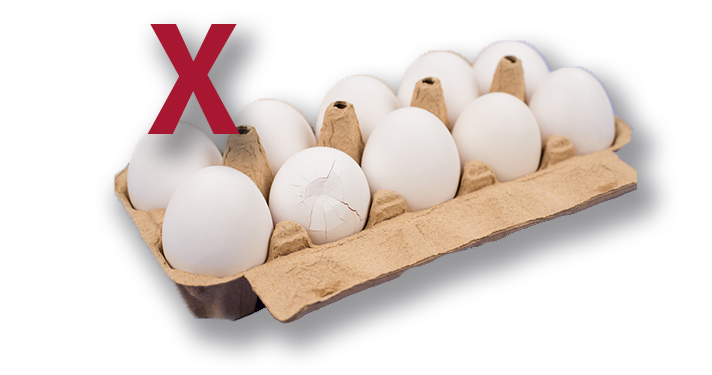
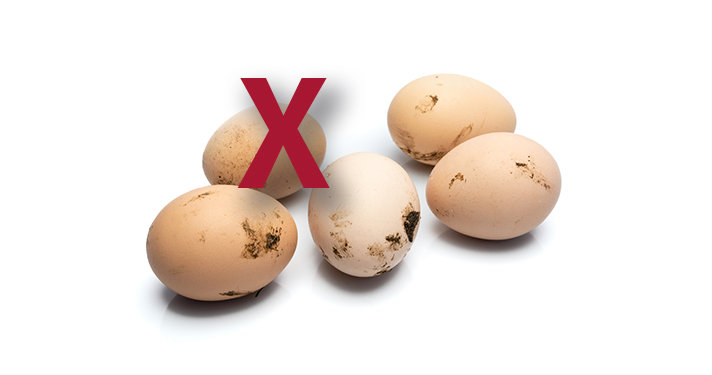
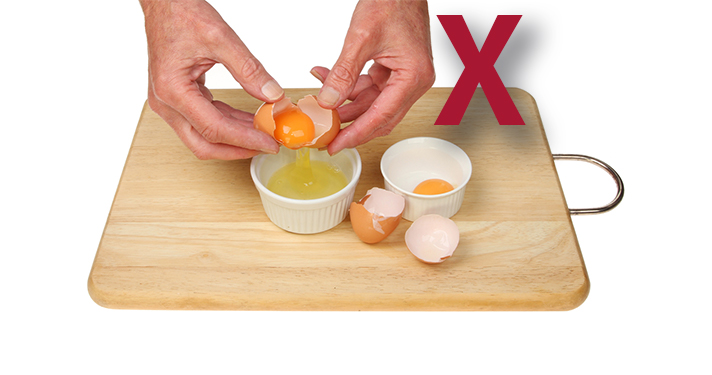
Cracked or dirty eggs
Never use cracked or dirty eggs in the preparation of food.
Dirty eggs may have harmful bacteria on the shell. Cracked eggs allow bacteria to enter and grow inside the egg.
Never wash a dirty egg as this may force bacteria through small cracks into the egg.
Storing raw eggs and egg products
When storing eggs and egg products:
- stored them in the fridge, at 5°C or less
- avoid cross contamination by throwing out eggs and cartons that contained cracked eggs
- make smaller batches as you need them
- store eggs in their original carton and do not use eggs that are ‘out of date’
- throw out uneaten egg products within 24 hours.
Handling raw eggs and egg products
Even handling eggs with clean, cracked shells can pose a risk if handled incorrectly. Cross contamination can also occur when handling eggs. Equipment and benches should be cleaned and sanitised before and after handling raw eggs and egg products to prevent cross contamination.
When handling eggs:
- wash hands before and after handling eggs and avoiding unnecessary handling
- minimise the contact between the shell and egg contents when breaking eggs
- ensure utensils, equipment and other food contact surfaces such as benches are cleaned and sanitised after handling eggs and egg products
- use a clean separate container for each batch of raw egg product and only refill the container once it has been cleaned and sanitised.
Did you know?
Never leave foods that contain raw egg out of the fridge for any longer than four hours in total. If not consumed within a day, throw it out.
Separating eggs
- egg shells should not be used to separate the egg white from the yolk as bacteria on the surface of the shell can be transferred to the contents of the egg
- use a clean and sanitised egg separator to reduce the risk of any bacteria contaminating the egg yolk or egg white
- separating the eggs using bare hands is also a risk as hands may become contaminated with bacteria which can be transferred to other food or equipment.
Warning
Hands should be washed and dried before and after handling eggs.
Cross contamination
Cross contamination can occur when eggs or egg products are not handled properly.
Equipment that has been used to prepare egg products such as stick blenders, mixers, food processors and chopping boards must be cleaned and sanitised prior to use with a dishwasher or chemical sanitiser. Blenders, mixers and processors must be dismantled to allow proper cleaning of internal parts.
You can minimise the risk of food poisoning from these foods by:
- ensuring the eggs you use are clean and the shells are not cracked
- make the food item on the day you plan to eat it
- keep eggs refrigerated until you are ready to use them
- always store raw egg foods in the fridge until serving
- throw away foods with raw eggs in them if they are out of the fridge for more than four hours
- throw away unused foods with raw eggs in them after one day
- pack foods that contain raw egg in an insulated cooler with enough ice, ice blocks or frozen drinks to keep them cold when transporting them.
Egg safety for vulnerable people
Anyone can be affected by Salmonella but certain people are at greater risk of severe illness. This includes:
- including older adults (over 60 years)
- pregnant women
- young children (under 5 years)
- people with weakened immune systems.
Only use raw eggs in dishes that are thoroughly cooked or cook eggs until both the yolk and the white are firm. Eating raw eggs, eggs with runny yolks or food that contains raw or lightly cooked egg can cause food poisoning, especially those in the ‘at risk group’.
When catering for large or ‘at risk' groups, avoid preparing and serving food that contains raw or lightly cooked eggs such as scrambled eggs and egg based salad dressing and desserts. It is recommended that you use pasteurised egg and egg products to minimise the risk of foodborne illnesses.
Warning
Only use raw eggs in dishes that are thoroughly cooked or cook eggs until both the yolk and the white are firm.
Backyard chickens
Eggs bought from retail outlets undergo a cleaning process before being sold. If you collect eggs from your own chickens, this process won’t have been completed.
To reduce the risk of infection you should collect eggs twice a day, particularly in warmer weather. Throw away eggs that are cracked, broken or might have been undiscovered in a nest for an extended period of time.
To clean your eggs, wipe them with a paper towel to remove any dirt or faeces (poo), use a new paper towel for each egg. Remember: never wash eggs. If an egg will not wipe clean, it should be thrown out.
Store your eggs in clean containers in the fridge and find a way to know which eggs are which, so that you use the oldest eggs first.


